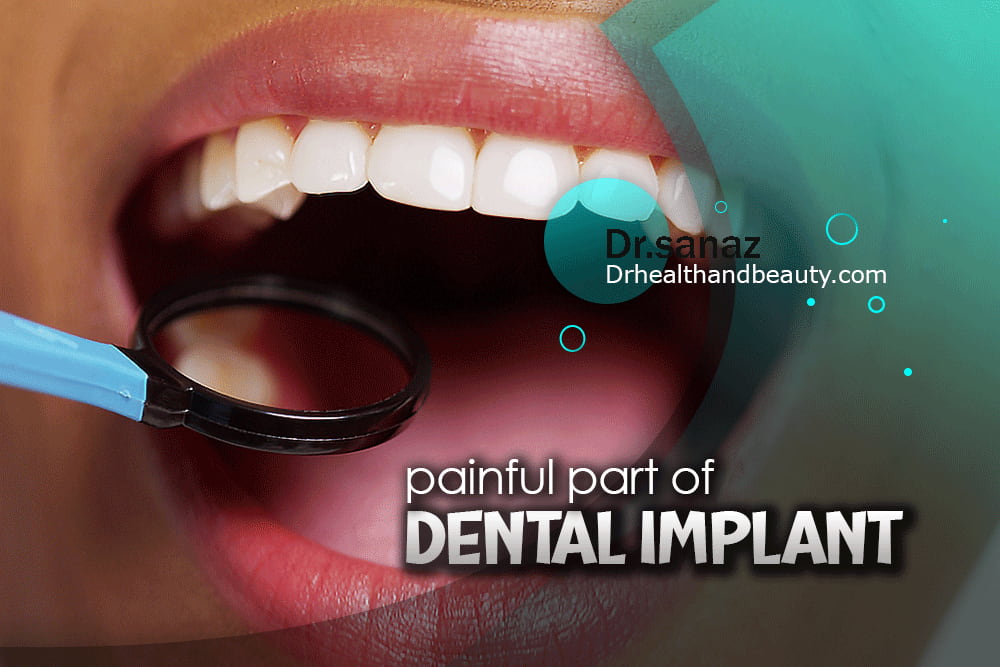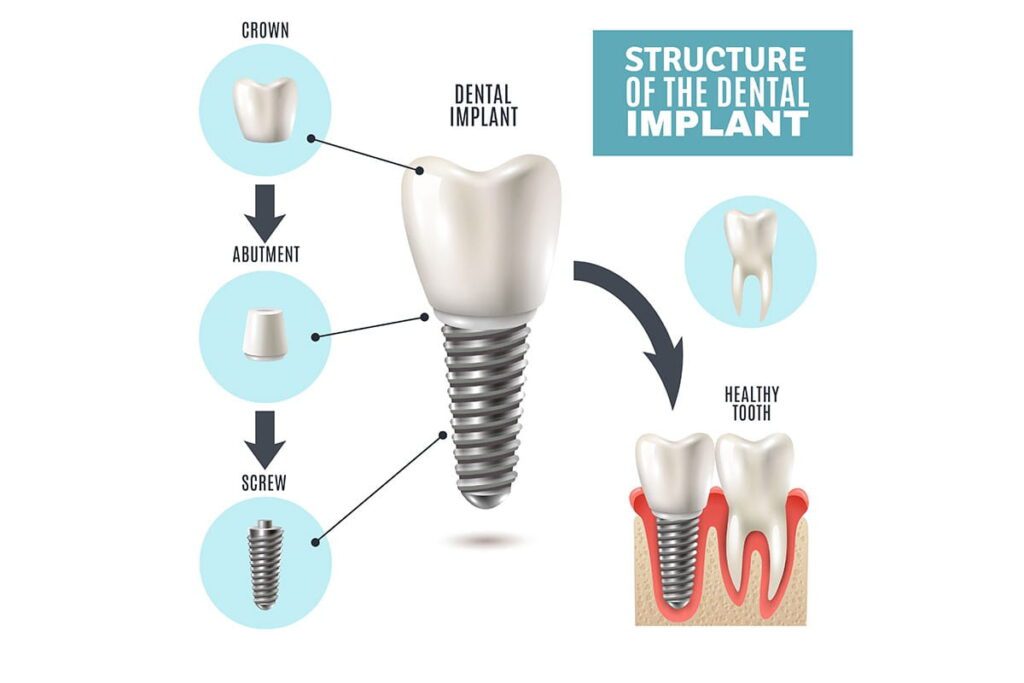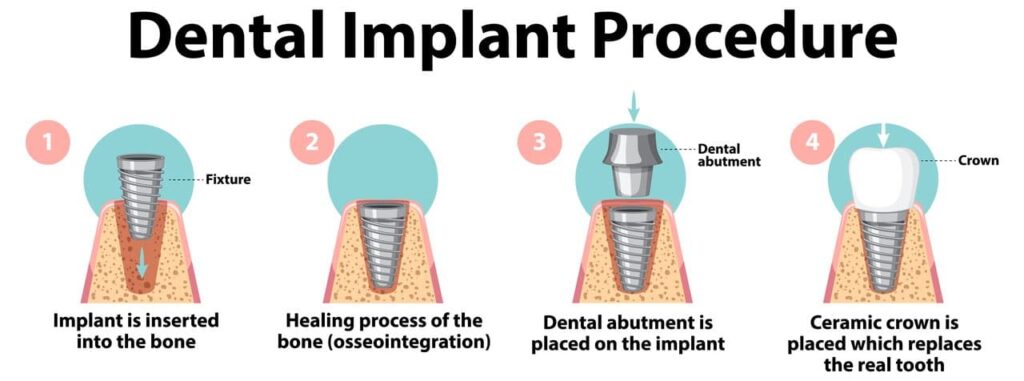

What Is The Most Painful Part Of A Dental Implant?
The content of this article is approved by “drhealthandbeauty” experts.
Note: This article is only to guide and increase your knowledge. Before taking any action, you can consult “drhealthandbeauty” doctors or your doctor for treatment.
Dentistry has always been one of the professions traditionally involving pain because it deals with a susceptible organ and container called teeth.
Based on my years of experience in this field, the question most patients ask after being offered treatment for their dental problem is: Does pain accompany it? Or: How much does it hurt?
Dentistry has made significant progress in today’s world. One of the most critical developments in this direction is Replacing permanent dental implants and immediate implants instead of missing teeth. By using this treatment method, you can have permanent teeth. An implant is a procedure that involves implanting an artificial base in the jawbone and then installing an artificial tooth on it.
This method, which is a cosmetic restorative method, helps a lot to restore the function and beauty of the original teeth. In general, we must point out that, despite the numerous advantages, dental implants, like any other treatment method, bring their own challenges. Dental implants say let’s see.
It should be noted that pain is a common concern among patients who intend to receive dental implants. While any type of dental surgery comes with some discomfort, patients generally find that the pain of dental implants is well worth the good results.
In this valuable article from Drhealthandbeauty by Dr.Sanaz, which is the result of my years of professional work experience in this field, we will examine the various stages of dental implants and the amount of difficulty that the patient will face in order to provide a comprehensive guide for you who are planning to have dental implants. We have to offer.
Table of Contents

Are dental implants painful?
After any surgical procedure, some pain and discomfort are expected. Many patients find that after the anesthesia wears off, pain is one of the first things they notice after implant placement. After dental implant surgery, the dentist may prescribe pain medication to relieve discomfort.
In the areas where the implant is located, as well as in and around the jaw, you may experience discomfort due to the perforation of the gums for about a week after the operation.
Depending on the location of the implant, this pain may spread to the cheeks, chin, or under the eyes. Most patients consider the pain of dental implant surgery to be about the same as having a tooth extracted or a root canal, although the degree of discomfort and pain varies from patient to patient.

Examining the different stages of dental implants
The first stage of examination:
As you know, dental implants, as one of the options for dental beauty services, has a multi-step process, the first step of which starts with careful preparation.
This stage is the easiest and the first stage of a dental implant, which includes examining the condition of the jawbones, teeth, and gum tissue using digital photos.
At this stage, detailed dental examinations are carried out, and then the condition of the patient’s mouth and jaw is determined using advanced imaging. These imaging are performed with the aim of evaluating the condition of the jaw bone and identifying the best point for placing the implant. Another point is that, in the first stage, we can recognize and treat health conditions that may affect the implant process, such as gum disease or osteoporosis.
At this stage, it is determined what type of implant will be used for the person, which teeth should remain, and which should be restored.
The second stage – extraction of roots and teeth:
The second stage of the implant may not be difficult for the dentist, but it may be a little painful for the patient. After examining the mouth and teeth, according to the condition of the teeth, the dentist determines the tooth that is not in a good condition, depending on the diagnosis of root extraction or tooth restoration, Because a root of the tooth should not remain in the jaw during the implant.
The third stage – implantation of the implant fixture:
In the discussion of the most difficult stage of the implant, we reach the second part. It is usually said that this stage is painful.
To understand this issue more, we will examine the second stage. In this department, implant-based surgery is performed. According to patients, this stage is known as the most difficult stage of the implant.
At this stage, after the local anesthetic procedure, the surgeon makes a small incision on the gum so that he can access the jawbone.
Next, a small hole is made in the bone, then the titanium base of the implant is placed in it. In fact, this base acts as an artificial tooth root. In order to avoid damage to the surrounding nerves and tissues, high precision and skill are vital in this step.
In short, implanting a fixture, which is the basic foundation of implant durability, and the dentist or implantologist must make a gap in the gum of the desired tooth and place the fixture inside the gum, can be the most painful stage of the dental implant. The use of this stage is to allow food to enter. It does not give the place of planting.
The fourth stage of the implant – osseointegration
After the surgery, the recovery period begins, in which the jawbone is integrated with the implant base. The so-called osseointegration in the dental implant may take several months.
During this period, it is necessary to take careful care and follow the instructions given by the dentist after the surgery, including eating soft foods and avoiding heavy activities to avoid any pressure or damage to the operated area.
The fifth stage of dental implant – abutment
In the continuation of the most difficult stage of the implant, we must point out that after completing the healing process and making sure that the base is firmly fixed in the bone, it is time for the final stage of the implant.
At this stage, the dentist places an abutment (an intermediate piece) that is connected to a base in the tooth so that, with its help, the crown of the artificial tooth is installed on it. The crown is carefully based on the color and shape of the natural teeth. The patient is made, and the abutments are installed on the abutment; this is how the dental implant process ends.
As the fifth stage of a dental implant, this stage is not difficult for the dentist and the client. It is done in one session, and local anesthetic is used.
The sixth stage – healing implant
The implant is located below the gum line, and in order to connect the crown to it, we need a piece that can facilitate access.
The healing implant is the part that makes it easy to access. In fact, we can claim that the healing implant is a piece that helps implant treatment to be done in the best possible way. Using this piece, dentists can shape the gums and then attach it to the upper part of the implant like a screw.
The seventh step – Molding:
The seventh step is molding the tooth to prepare the dental veneer, and it is considered the easiest step. Molding of the implant is done to make the shape and image of the dental implant the same as that of natural teeth.
A unique material is poured into the molding tray and placed on the desired part so that the shape of the teeth fits inside the tray.
The eighth step – placing the cover and installing the crown:
The final stage of the implant is the placement of the cover and installation of the temporary and permanent crown.
This stage, like the previous two stages, is not the most difficult stage of dental implants. First, the temporary crown (tooth cover) is installed for 4 to 6 weeks, and then the permanent crown is installed for the tooth that has been implanted.
The most difficult stage of the implant for dentists
According to dentists and implantologists, the most difficult stage of dental implants includes the following:
Evaluation and review
Evaluation and review of the initial stage for implant installation, including examination of the bone structure of the jaw and bone decay, the extent of muscle and soft tissue survival in the desired area, assessment of some medical factors such as general diseases and side effects, the amount of bone density and position Nerves and vessels are near the implant installation area, etc.
This stage is very sensitive or difficult because if this stage is not done well, there may be problems such as insufficient bone to install the implant, risk of tooth infection, lack of optimal strength of the implant, etc.
Surgery
The implant surgery stage is also one of the most difficult stages in the opinion of dentists.
At this stage, the dentist must accurately fix the implant in the jaw bone, which includes making a precise hole in the bone, placing the implant, and surrounding it with soft tissues.
Implant surgery requires a lot of skill and precision from the dentist, and a mistake at this stage can lead to problems such as implant weakness, infection, and damage to nerves and vessels.
Dental prosthesis
After the surgery, the stage of placing the dental prosthesis on the implant takes place.
This stage includes taking accurate measurements to make a dental prosthesis in the laboratory, adjusting and adapting the prosthesis to the previous surgery, and placing the prosthesis on the implant, which makes the need for precision a sensitive and difficult stage.
In general, any stage of dental implant treatment may be challenging and difficult for the dentist. But, the most important thing is that the dentist has enough expertise and experience.

Factors affecting the complexity and difficulty of implant surgery
There are various factors that can affect the amount of pain felt after implant surgery, as well as the difficulty of dental implant procedures. For example :
If your surgery is more complicated or requires bone grafting, sinus surgery, or other additional treatments, You can expect more pain after treatment.
One of the most critical factors that affect the most difficult stage of the implant and the complexity of the implant surgery is the condition of the patient’s jaw bone. One of the main issues in this field is the quality of the patient’s jaw bone; Sufficient and strong bone is necessary to support the dental implant.
In cases where the jaw bone is insufficient or weak, there is a possibility of needing additional measures such as bone grafting or bone strengthening procedures. These additional requirements only add more time to the implant operation and increase the complexity of the surgery.
A critical point that should not be ignored is that in addition to the jaw bone, things like the health of the patient’s mouth and gums also play an essential role in the complexity of implant surgery.
Suffering from gum diseases such as periodontitis makes it possible to leave a negative impact on the ability of the gums to repair and support the implant. Also, having oral infections or gingivitis can lead to increased risks associated with surgery and can also lead to a more extended recovery period and a longer patient recovery.
Besides the physiological parameters, another important and influential factor is the surgeon’s skill and experience, which is the most difficult stage of dental implant surgery.
Choosing a skilled and experienced dental surgeon can prevent damage to the surrounding tissues and nerves with high precision and skill, as well as greatly increase the probability of surgery success. In fact, you can help reduce the possible complications in this process by choosing an experienced and specialized dental implant surgeon.
As mentioned, the complexity of the operation can affect the amount of pain. Bone grafting or sinus lift before the operation will usually cause more sensitivity in the patient.
You may also experience some side effects, such as bruising, swelling, and bleeding, depending on the health of your gums and bones. This experience is different for different people, and so the speed of their recovery is different.
In the end, we must say that the patient’s lifestyle and habits are other factors that can affect the complexity of implant surgery. Parameters such as smoking or alcohol consumption can affect the healing process and slow it down.
Furthermore, we must say that some factors may reduce the probability of implant success. In addition, you should pay attention to the fact that improper nutrition and lack of oral and dental hygiene can also cause problems in the healing process.
Related: “How To Keep Healthy Oral Microbiome“

How do you pass the most difficult stage of the implant?
In order to successfully pass the most difficult stage of dental implant surgery, we must pay attention to several points. Among these points, the following can be mentioned:
Selection of a specialist doctor: To implant an implant fixture, we must use a doctor who has experience, skills, and a valid degree in the field of implantology. This can help reduce the risks of surgery and increase the chance of success.
Following the doctor’s instructions: To implant the implant fixture, we must follow the instructions given by the doctor. These guidelines may include things like diet, medication, oral and dental care, smoking and alcohol bans, and physical activity restrictions. This can help speed up healing and prevent infection and inflammation.
Patience: We must be patient while implanting the implant fixture. This process may take several months or even several years and require several visits and different steps. This can help build trust and compliance with the implant fixture and crown or denture.

Frequently Asked Questions
What is the most difficult stage of the implant, and how long does it take?
The most difficult stage of the dental implant is the Fixture planting, and it takes approximately 3 to 5 months.
Are dental implants painful?
Dental implant surgery is usually performed under local anesthesia so the patient does not feel pain during the surgery. After the surgery, it is possible for the patient to feel some pain or discomfort, which is different for each patient and can be controlled with pain medication.
How long does it take to fuse the fixture stage with the maxillary bone?
It takes about three months.
How long does it take to fuse the fixture stage with the mandibular bone?
It takes about five months.
Who are good candidates for dental implants?
People who are good candidates for dental implants should have good general health, enough jawbones to support the implant and healthy gums. Smoking or certain medical conditions can greatly reduce the chance of success.
Are there any complications after implant surgery?
After implant surgery, temporary complications such as swelling, bleeding, and temporary pain may occur.
How long does a dental implant last?
Patients can maintain their dental implants for decades with proper care. In fact, we must say that the life of the implant depends on factors such as the health of the patient’s mouth and teeth, periodical care, and people’s lifestyle.
How should the implant be cared for, and does it need periodical repair?
To take care of your implant, you must pay special attention to your oral hygiene. It is necessary to clean the teeth, brush and floss, and visit the dentist regularly for examination. In case of need for periodical restoration by visiting the dentist, the problems related to the implant can be improved.
Related: “What Is The Cause Of Tooth Decay Despite Brushing?“
How long does a dental implant last?
Patients can maintain their dental implants for decades with proper care. In fact, we must say that the life of the implant depends on factors such as the health of the patient’s mouth and teeth, periodical care, and people’s lifestyle.
Conclusion
As the most difficult stage of the implant was discussed in this comprehensive guide, after familiarizing yourself with the different stages of the dental implant, you realized that the installation of the fixture and the fusion of the jaw bone with the fixture is the most difficult stage of the implant, from the point of view of dentists and patients.
It is better to know that before the dental implant, you will be examined by the dental team and the surgeon, and they will tell you all the cases and steps that you are going to go through at a cost.

